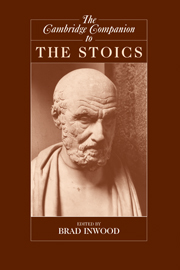Book contents
- Frontmatter
- Introduction
- 1 The School, from Zeno to Arius Didymus
- 2 The School in the Roman Imperial Period
- 3 Stoic Epistemology
- 4 Logic
- 5 Stoic Natural Philosophy (Physics and Cosmology)
- 6 Stoic Theology
- 7 Stoic Determinism
- 8 Stoic Metaphysics
- 9 Stoic Ethics
- 10 Stoic Moral Psychology
- 11 Stoicism and Medicine
- 12 The Stoic Contribution to Traditional Grammar
- 13 The Stoics and the Astronomical Sciences
- 14 Stoic Naturalism and Its Critics
- 15 Stoicism in the Philosophical Tradition
- Bibliography
- List of Primary Works
- Index
3 - Stoic Epistemology
Published online by Cambridge University Press: 28 May 2006
- Frontmatter
- Introduction
- 1 The School, from Zeno to Arius Didymus
- 2 The School in the Roman Imperial Period
- 3 Stoic Epistemology
- 4 Logic
- 5 Stoic Natural Philosophy (Physics and Cosmology)
- 6 Stoic Theology
- 7 Stoic Determinism
- 8 Stoic Metaphysics
- 9 Stoic Ethics
- 10 Stoic Moral Psychology
- 11 Stoicism and Medicine
- 12 The Stoic Contribution to Traditional Grammar
- 13 The Stoics and the Astronomical Sciences
- 14 Stoic Naturalism and Its Critics
- 15 Stoicism in the Philosophical Tradition
- Bibliography
- List of Primary Works
- Index
Summary
Stoic Sages never make mistakes. Secure in their understanding of the providential structure of the world, which is identical with fate, which in turn is identical with the will of Zeus (DL VII 135, =SVF 2.580; Plutarch, St. rep. 1049f, 1056c = SVF 2.937; cf. 2.931, 2.1076), Sages order their lives in accordance with it, assimilating their will to the will of Zeus, living in accordance with nature, and so achieving the smooth flow of life, the eurhoia biou so devoutly to be wished for (DL VII 87, =SVF 3.4; Cicero, Fin. III 31, IV 14-15, =SVF 3.15, 3.13; cf. 3.4-9, 3.12-16).
It seems clear enough that if the Sage is to be anything more than an unattainable, regulative ideal (and that is a big ‘if’), the Stoics need powerful reasons, in the form of a powerful epistemology, for supposing that such practical infallibility can ever actually be attainable. And even if the Sage is supposed only to be an ideal figure (and the Stoics were doubtful whether such a superhuman ethical cognizer ever had existed: Sextus, M IX 133, =54D LS; Alexander, Fat. 199.16, =SVF 3.658, =61N LS), still, for the ideal to function as anything more than a piece of remote wishful thinking, it had better be possible at least to approach that ideal; and the Stoics did indeed set great store by the notion of prokopê, moral and cognitive progress (Stobaeus V 906.18–907.5, =SVF 3.510, =59I LS).
- Type
- Chapter
- Information
- The Cambridge Companion to the Stoics , pp. 59 - 84Publisher: Cambridge University PressPrint publication year: 2003
- 12
- Cited by



